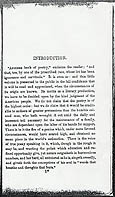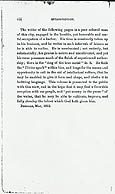

|
|
Table of Contents: Cover Page Dedication Introduction "America" "Christmas Hymn" "Lines on the Death of J. Quincy Adams" "To Cinque" "New Year's Hymn" "To A.H." "Love" "How Long" "The Arch Apostate" "The Misanthropist" "A Hymn" "Yes! strike again that sounding string" "To -------" "Prayer of the Oppressed" "To S.A.T." "Delusive Hope" "To M.E.A." "A Hymn" "Self-Reliance" "Ode for the Fourth of July" "Midnight Musings" "Ode to Music" "Stanzas for the First of August" "The North Star" (text of all poems) |

|
"ANOTHER book of poetry," exclaims the reader; "and that, too, by one of the proscribed race, whose lot has been ignorance and servitude." It is even so: and this little volume is presented to the public in the full confidence that it will be read and appreciated, when the circumstances of its origin are known. Its merits as a literary production, we leave to be decided upon by the kind judgment of the American people. We do not claim that the poetry is of the highest order: but we do claim that it would be creditable to authors of greater pretensions than the humble colored man, who hath wrought it out amid the daily and incessant toil necessary for the maintenance of a family, who are dependent upon the labor of his hands for support. There is in it the fire of a genius which, under more favored circumstances, would have soared high, aud [sic] obtained no mean place in the world's estimation. There is the voice of true poesy speaking in it, which, though in the rough it may be, and wanting the polish which education and refined opportunity give, yet nature outgusheth in harmonious numbers, and her bard, all untutored as he is, singeth sweetly, and giveth forth the conceptions of his soul in "words that breathe and thoughts that burn." |
||

|
The writer of the following pages is a poor colored man of this city, engaged in the humble, yet honorable and useful occupation of a barber. His time is constantly taken up in his business, and he writes in such intervals of leisure as he is able to realize. He is uneducated; not entirely, but substantially; his genius is native and uncultivated, and yet his verse possesses much of the finish of experienced authorship; there is the "ring of the true metal" in it. He feels the "Divine spark" within him, and longs for the means and opportunity to call in the aid of intellectual culture, that he may be enabled to give it form and shape, and clothe it in befitting language. This volume is presented to the public with this view, and in the hope that it may find a favorable reception with our people, and "put money in the purse" of the writer, that he may be able to cultivate, improve, and fully develop the talent which God hath given him. BUFFALO, MAY, 1853. |